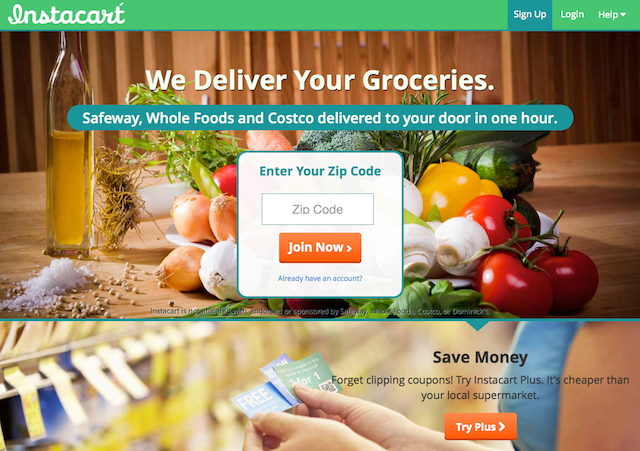“Never set foot in a grocery store again,” promises Instacart on its website. Given the rapid pace of its expansion — the startup announced today that it’s adding seven more cities in the San Francisco Bay Area — those grocery-storeless feet may someday belong to you.
Launched in mid-2012, the company provides an expert shopping service that delivers groceries in the service area anywhere from an hour after placing an order to a scheduled time during a day, depending on your urgency. Stores include Whole Foods, Trader Joe’s, Costco, and Safeway.
Founder and CEO Apoorva Mehta told VentureBeat that Instacart will complement the Bay Area expansion, on top of previous coverage in 10 Bay Area cities, with the addition of seven more major metropolitan areas by the end of this year. “We’ve been growing at 10 percent a week” since December, he said.
For orders $35 and above, the service charge is only $4 for delivery within two hours or for delivery that same day within a one-hour window. If you’re starving, it’s $15 for delivery within one hour. Instacart apparently has some financial relationship with the grocery stores, although Mehta declined to elaborate on that or the company’s current number of customers.
Goodbye, checkout lanes
Mehta, who had been working with Amazon Global Fulfillment to ship packages more efficiently before he started Instacart, noted that the model of a groceries warehouse with trucks — what he described as “the Webvan era” — didn’t work. Instead, Instacart, with $11 million in venture funding, uses sophisticated software and contracted, as-available expert shoppers, using their own vehicles.
When someone places an order online via an app or the website, the company’s intelligent fulfillment engine is utilized by the Personal Shoppers. In addition to the grocery list, the software knows where each item’s location in each store and provides the most efficient path to plucking. “Think of it as technology that mapped out the store,” he said, noting that machine learning improves the paths.
The shoppers have undergone background checks and training on the software, and Mehta said that, in many cases, “this amazing group of individuals can pick produce better than customers.”
Will you really be able to swear off grocery store shopping? “One of the most interesting parts” of his company’s short-lived experience, Mehta said, “is that about 90 percent of our customers completely stop going to grocery stores.”


